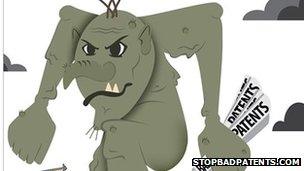US shops and restaurants fight patent trolls
- Published

The print and radio campaign will be shown across 15 US states.
The Internet Association is among a group of US trade bodies behind a new campaign calling for politicians to take action over patent trolls.
Patent trolls acquire the rights to inventions and then demand payment to use them while making few if any products of their own.
Shops and restaurants have been targeted for displaying QR codes and online store-locators, say the groups.
The radio and print adverts will appear in 15 US states.
"Patent trolls don't make anything, they just get rich," is a line from the Stop Bad Patents campaign, which claims that businesses can find themselves facing demands for $100,000 (£65,000) to settle - a considerable sum but often cheaper than defending themselves in court.
Its organisers want voters to contact their Congress representatives asking them to "stop bad patents, stop the trolls".
'Legalised extortion'
It is a joint initiative between the Internet Association, the National Restaurant Association, the National Retail Federation and the Food Marketing Institute, all of whom say their members are increasingly being targeted.
"Patent trolls use bad patents to bully companies of all sizes, in every economic sector, from coast to coast," said Michael Beckerman, President of The Internet Association.
"This is essentially legalised extortion, forcing hard-working businesses to go to court or write a cheque."
US President Barack Obama has already called on Congress to tackle the problem of people facing legal action over commonly used technology from others who had own patents to it.
Speaking to the BBC earlier this month, Alan Schoenbaum, general counsel at the cloud computing firm Rackspace, explained that patent trolls are often "entrepreneurs or finance people" rather than genuine inventors of new technology.
"Defending a lawsuit is extremely expensive... they play on that fear that the defendant is going to spend a lot of money to defend itself and it is simply cheaper to pay them off," he said.
However Erich Spangenberg, owner of "patent monetisation" company IP Nav, says the practice of buying patents and asserting that right is already commonplace in other industries.
"Much like an architect can design a building but does not build it, a song-writer can compose a song but doesn't have to sing it, an inventor can get granted a patent and ultimately is not forced to practise it," he responded.
- Published20 August 2013
- Published20 August 2013
- Published20 August 2013